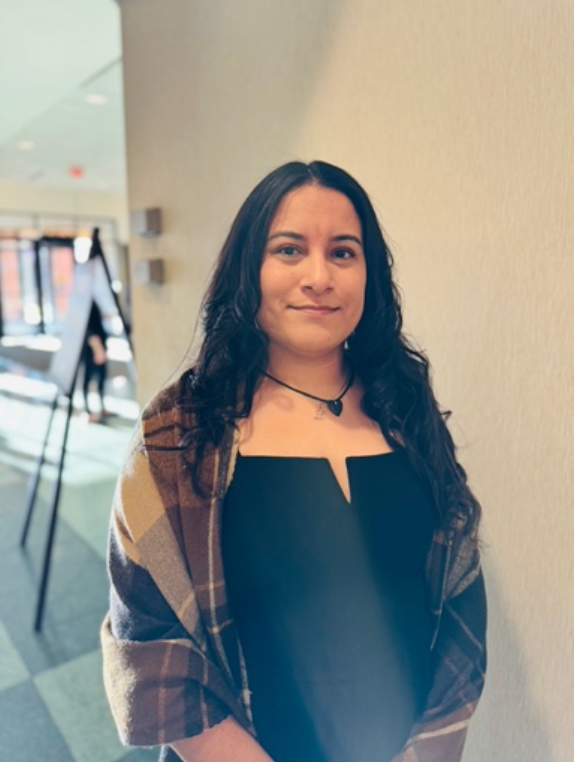for Webflow

Born in León, Guanajuato, México, María Guadalupe Serna grew up amidst the Hispanic-immigrant community populating the southside of Milwaukee, Wisconsin. A native Spanish speaker, she received a bilingual, public education at J.W. Riley Elementary School. From there, she completed one year of middle school in MPS before enrolling in a private, all-girls middle school– Notre Dame. Lupe continued receiving a private education at an all-girls high school, Divine Savior Holy Angels, where she graduated in 2015.
Upon acceptance into the Marquette University Urban Scholars Program– a full-tuition scholarship program awarded to low-income, first-generation college students– Lupe enrolled in the College of Education. During her time at Marquette, she formed a part of the Latin American Student Organization (LASO), participated in the Dreamer’s Support Group, and was involved in the planning of the annual Dreamer’s Gala. As she took classes for her Elementary Education major, she enjoyed learning new ways to teach math for understanding because it allowed her to rediscover the fun in mathematics.
After earning her Bachelor’s Degree in 2019, Lupe began teaching second grade at Academia de Lenguaje y Bellas Artes (ALBA), a bilingual Spanish/English charter school. During her four years at ALBA, Lupe taught second grade, fourth grade, middle school ELA and middle school math. In 2023, she decided to pursue her love for math and began taking classes to obtain a math teaching license. That same year, she transferred to Kagel School, a public dual-language school, where she was able to continue teaching middle school math.
In December of 2024, Lupe graduated with a Master of Science in Curriculum and Instruction with a concentration in Mathematics Teacher Leadership from the University of Wisconsin- Milwaukee. Lupe has presented her capstone project and her self-study findings at the Wisconsin Mathematics Council’s Annual Conference, as well as participated as a panelist at a film screening and discussion of “Counted Out” at UW-Milwaukee.
For the time being, she continues to teach middle school math at Kagel School and hopes to continue sharing her experiences and findings at math conferences.
While taking classes for her Masters, Lupe was reminded of the many obstacles students face in the math classroom, particularly the challenges endured by bilingual and emergent bilingual students. Reflecting on her observations in the classroom and thinking back to her own experiences as a math learner and as a bilingual student, Lupe noticed gaps in research studies that focused on bilingual students in the math classroom. For her capstone project, Lupe took a deeper look at bilingual students’ mathematical identity, examining how bilingual students view themselves as capable of engaging in and doing mathematics. Her hope was to gain insight into what bilingual students need to grow more confident in their skills and be able to see themselves as capable mathematicians. Lupe’s study revealed key differences among two distinguishable groups of bilingual students– U.S. natives and recent arrivals. Results showed significant differences in seventh-grade bilingual students’ mindset, participation and effort, and mathematical agency.
Since graduating, Lupe has continued to explore effective mathematics teaching practices while teaching middle school emergent bilingual learners. The diverse backgrounds of her students and their varying levels of English language proficiency challenge her to simultaneously address content and language development during instruction. Although finding the right balance has been difficult, Lupe recognizes the importance of strategically planning for the implementation of both to further empower bilingual students within and beyond the classroom. In an effort to bridge emergent bilinguals’ language development and strengthen their mathematical identity, Lupe has focused on refining the use of language supports within her math instruction to allow for students’ oracy development, as well as encourage computational thinking practices for students’ active employment of the Standards for Mathematical Practice.
Lupe Serna hopes to continue improving her teaching practices in the classroom by modifying instructional approaches to better support the development of the whole bilingual student without neglecting their mathematical identity. Her wish is for all students, regardless of nationality or English proficiency, to feel accepted, valued and, above all, that they belong in mathematics. Although she admits she, herself, continues to struggle with that to this day, Lupe believes changing the narrative of who belongs in mathematics is not only possible, but necessary, in order to weaken the power systemic barriers and damaging cycles have on underrepresented groups and minorities.
“Growing up, surrounded by a Hispanic community and attending a bilingual school, speaking two languages and celebrating my cultural roots was the norm for me. When I got to high school, I found myself, for the first time in my life, in a position of inferiority. It seemed like my teachers and peers only expressed interest in getting to know my culture during Hispanic Heritage Month. Spanish greetings were heard over the intercom during morning announcements and Latin music filled the hallways during transition times. The entire month became an opportunity for the Hispanic students and club to share and showcase our culture and educate others on our diversity. Of course, one month was never enough. For me, Hispanic Heritage month is year-round; it’s a celebration of diverse cultures and roots, the recognition of our ancestors, and the acknowledgement of Hispanic contributions around the world. Hispanic Heritage Month is taking a stance to show our support for Hispanics and proudly representing our cultural heritage.”